“If you’re nutritionally deficient, you will create disease, there’s no escaping it.”
~ Dr. Terry Wahls
Fear of Food
Look at the joy in that little girl’s face. She is loving that peach! When you have autoimmune disease and choose food as medicine, sometimes that joy gets replaced with fear. When I first discovered the connection between food intolerance and rheumatoid arthritis pain, I went through a period of being afraid every time I sat down to eat. Finding the paleo diet was a gift, because it gave me a template of safe foods to enjoy. When I hit a healing plateau, I turned to the autoimmune protocol and learned that dairy and nightshades were inflammation triggers for me. I stopped eating them, and my flares disappeared altogether. Some people find they need to restrict further to feel their best, reducing their intake of FODMAPs or oxalates, for example. Are you seeing the pattern? In our journeys to heal, the first thing we do is eliminate foods that are the problem. The question is, are we also focusing on the foods that are the solution?
Nutrient Density
Dr. Terry Wahls is famous in the paleo community for reversing her multiple sclerosis symptoms, moving from a wheelchair to a bicycle in less than a year. But did you know it wasn’t the paleo diet that created this miracle? Going paleo slowed her decline, but she didn’t get better until she discovered the 31 micronutrients the body needs, and the foods that provide these nutrients, and started making them part of her daily diet.
Removing inflammatory foods helps take us out of crisis, but deep nutrition is required for us to heal from the inside out. Quite honestly, that’s hard to achieve without effort. Over the years, we’ve bred crops for a sweeter taste and higher yield. A side effect has been a dramatic loss in nutrient density. Jo Robinson, author of the book Eating on the Wild Side, spent a decade studying the nutrient content of modern vs. wild foods. This is what she found: “Dandelions, once a springtime treat for Native Americans, have seven times more phytonutrients than spinach, which we consider a ‘superfood.’ A purple potato native to Peru has 28 times more cancer-fighting anthocyanins than common russet potatoes. One species of apple has a staggering 100 times more phytonutrients than the Golden Delicious displayed in our supermarkets.” This is true across all produce, so to the get the nutrition we need, we need to go out of our way to choose the most nutrient-dense foods available, and we also need to eat more food overall than our ancestors did, especially if we’re trying to heal autoimmune disease.
How To Eat To Heal
- First, don’t assume you’re eating enough. Verify it. Enter your daily (or even better your weekly) diet into a website like cronometer.com. Are you meeting your macronutrient and micronutrient goals? If not, adjust your menu until you are. If you are particularly low on certain nutrients, search the internet for the foods highest in those nutrients, and start adding those foods to your menu.
- Don’t try to make up the difference with supplements. Whole foods are full of synergistic compounds that feed our bodies in ways scientists are just beginning to understand. A pill is a band-aid; food can heal.
- Make bone broth part of your daily diet. It’s filled with bone marrow, collagen, gelatin, glycine, proline, hyaluronic acid, chondroitin sulfate, calcium, phosphorus, magnesium, and potassium. Bone broth is a food that acts like a supplement, supporting the cellular processes that happen throughout our bodies every second of every day. It’s especially helpful for healing leaky gut.
- Eat organ meats at least once a week, more is even better. They contain between 10 and 100 times more nutrition than muscle meats, and are the quickest way to ensure you’re getting the building blocks your body needs to heal.
- Eat more wild caught seafood. It’s an easy-to-digest protein that’s high in omega 3 fatty acids and contains selenium and iodine, two essential minerals hard to find elsewhere.
- If you tolerate pastured egg yolks, add them to your daily diet. They are excellent sources of vitamins A, B12, D, E and K2, all of which are essential to autoimmune healing. This is why Sarah Ballantyne recommends them as one of the first foods to try to reintroduce, after the elimination period of the AIP.
- Increase your consumption of healthy fats. Every cell in your body is made of 50% fat and your brain is 60-70% fat. We’ve all been taught to fear fat over the past 50 years, but that advice was based on faulty science. Our bodies need fat!
- Load up on the vegetables. Dr. Terry Wahls recommends: 3 cups of greens, 3 cups of brightly colored, and 3 cups of sulfur-rich daily.
- The more variety your eat, the more diverse your nutrition. Every time you go to the grocery store or farmers market, buy something you’ve never tried before: a new fruit, vegetable, or cut of meat.
- Lastly, understand that food isn’t always the source of inflammation, and when it comes to healing there are many areas to address. Resources:
- 5 Ways to Reverse Autoimmunity That Have Nothing to Do With Food.
- Navigating Setbacks.
- Let’s leave our food fear behind.
You May Also Be Interested In
A version of this post originally appeared in my column in Paleo Magazine.
Credit: image at top of page from Bruce Tuten via Wikimedia.

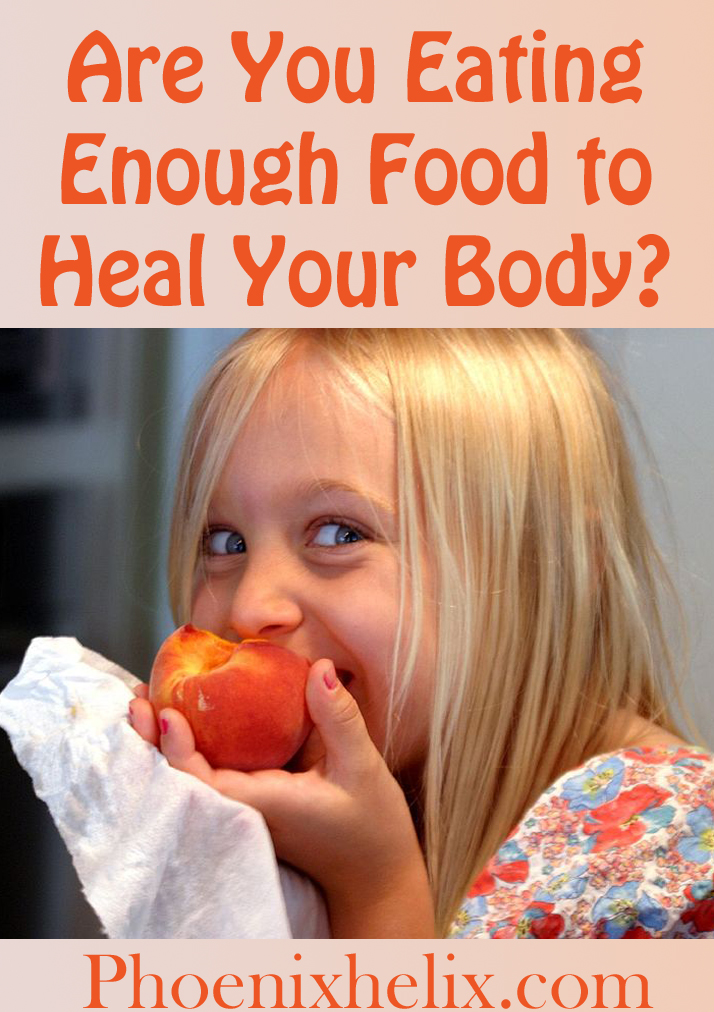

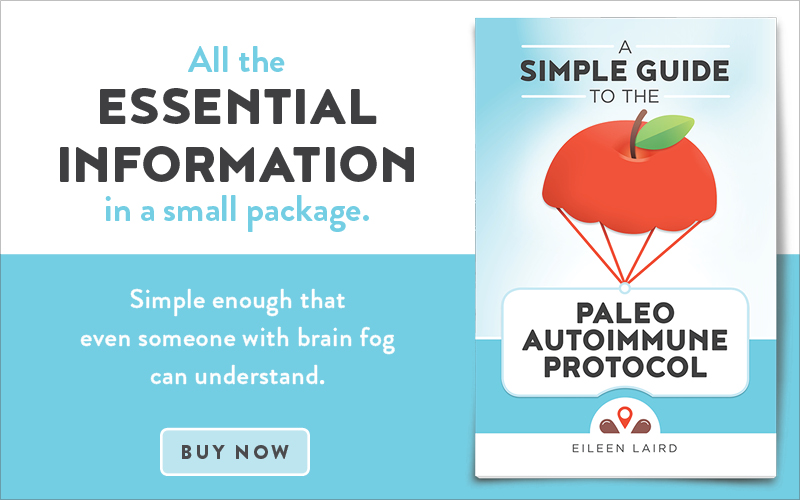



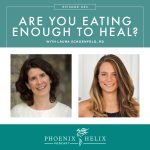
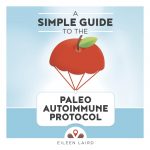
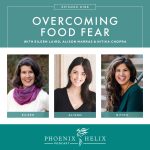

Seeing food as medicine and learning to nourish my body well has been on my mind these past weeks. It’s not easy! I don’t have much appetite. I have seen that I do not thrive unless I eat more fats, healthy carbs and veggies. I will try bone broth this week, everyone says it makes such a difference!
Thanks for writing, Audrey. Enjoy the bone broth, and I hope your appetite returns soon.
Great post! I need to be reminded of this every now and then. Think that I will use Cronometer.com and see where I am at.
It’s a pretty cool tool, Margaret. 🙂
I love all your posts Eileen! You bring up so many important points that other AIP bloggers tend not to address, such as eating enough on a restricted diet, not feeling guilty for needing medication, and how overwhelming this diet can be when you’re in pain. You are so down to earth and real and I just get so much out of your posts. Thank you.
Diana, your comment made my night! Thank you so much.
Hello.
I wondered if anyone has the same problem as me. I have been don’t AIP but extremely strict for a while. I got into remission (I got diagnosed with Lymes which causes auto immune effecting my joints but can control with food) but any time I eat something new I go back to square one. I can’t eat anything, I have bone broth, salad and some fish, no vege can’t tolerate it and no fruit just bananas. I can drink tea that’s it. I am underweight and desperate, I have just gone through a horrible divorce and am a single mum with in going issues with the ex but am learning to calm down the stress in any way I can.
I’m trying to heal my gut but I’m so depleted and can’t eat anything other than what I said above.
Any advise please.
Thank.you
Alison, you are right to be concerned. You absolutely need more food than that. I recommend working with a functional medicine practitioner to help you get at the root cause of your super sensitivity. I recommend The Paleo Mom Consulting.
Dear Alison, I have the same problem as you as far as being underweight. I am on no special kind of diet either because when I try to be, I become even thinner. So unhealthy and the way I am eating is as well. I try and eat only the good foods like, meat, veggies and fruits. I do eat Breyers ice cream to keep weight on. I want so badly to be gluten free and to try this Paleo diet but I know what will happen. I will loose weight. This article has been so incredibly good though that maybe there is help for those of us too thin. Thank you Eileen very much!! I have fibromyalgia which caused a whole host of other medical problems. This has been going on for 16 years now. I’m so exhausted and this is my worst symptom. I have started taking a med drop from Natural Choices and it has helped so much! It does have properties in it to help get the toxins out of the body and those days are very painful and hard. Must get rid of the toxins though. When this happens my Dr. told me to stop the med drops for a day or two so that’s what I do.
Hi Nancy. You might want to try the Perfect Health Diet. It’s similar to Paleo but allows some quality dairy (better than Bryers) along with white rice. A lot of people who struggle with weight gain do well on it.
If it wasn’t for your comment on supplements I would never think about checking the ingredients. I’ve been taking vitamin D for 10yrs. I have Dermatomyositis and can’t have sun exposure. My scalp and face never really cleared up. Lots of burning and itching . Your comments on checking ingredients got me to check and lord and behold there was corn and soy oil in it! Found new supplier with olive oil and oh my gosh 10yrs of suffering is gone! It was inflammation do to the bad oils. Staying with AIP because I have a lot of food allergies . Thank you so much for your wisdom that I know God has given you to help us who have felt lost and needed someone to guide us though our ( new way of life) . Forever great full
Wow! What a powerful testimonial to the importance of checking our supplement ingredients. Thank you so much for sharing that, Cindy. And I’m so happy for you that years of suffering is now gone!
How do you get 100% of your calcium in a day on AIP? It seems like too much kale or cruciferous veggies would worsen my hypothyroid. Bone broth only gives you so much calcium (some say not much). My RA reacts badly to sardines, milk, eggs, and even fortified OJ. I’m kinda stuck on this one…
According to Loren Cordain, it was the milk lobby that set the RDA for calcium, and it’s falsely high. I found that reassuring. I just focus on a diverse nutrient-dense diet and don’t worry about that one.
One note of caution…
I was doing all of these things to the extreme and feeling gradually worse until I realized I had a histamine intolerance and many of the most nutrient dense foods are high in histamine. Now I’m struggling to reduce my histamine level and figure out what I can eat. Unfortunately, it leaves me grossly lacking in fuel at the moment and as you mentioned, afraid of food.
It’s a journey for all of us. The more intolerances we have, the more important it is that we get past the fear and make sure we’re eating enough. Check out cronometer.com, if you haven’t already Staci. And a good blog for you to follow is Grazed and Enthused. She follows AIP + low-histamine, so all of her recipes should work for you.
Very interesting timing on this article. I’m so frustrated: been clean eating for almost 2years now, easing into AIP elimination for about 6 weeks (took out everything but coffee, stevia, and almond milk), and full AIP elimination for the past two weeks. I thought I was noticing a slight reduction in pain at the end of last week (not diagnosed, but more and more convinced I have RA). Then over the past three days I’ve had a definite return of pain in my hands and warmth returning to my knee. This seems to be a pattern for me in whatever I try: it seems to help for the first few days and then the symptoms come back and I fight a roller coaster battle no matter what I do. I also have issues with anxiety, high cortisol at night, low GABA, and trouble sleeping. I know those impact this all, but I can’t seem to “right” the problems to save my life. And…I can’t lose the weight I need to lose to help my joints and to help me psychologically. I’m very discouraged. With all of that said, I had about decided that I needed to stop eating all but one meal a day. It seems as if there is one hidden food or foods that I’m reacting to, but I can’t figure it out. The more I remove, it seems, the less my body is able to deal with food. It feels like the only answer is to stop eating. I want to believe that I can heal in this way… With food: that’s why I haven’t gone to the doctor for a diagnosis…. I want to do this THIS way and without medication, but doggone, I’m not sure how much longer I can do this when It continues to seemingly not work for me, and I think its making me depressed on top of everything else. Can you give me some advice?
Oh Beth, my heart goes out to you. It sounds like you need help, and if you don’t want to see a conventional doctor, I recommend Anne Angelone at The Paleo Mom Consulting. She’s a functional medicine practitioner and is really good at doing a health assessment and figuring out where to start troubleshooting. Stopping eating isn’t the answer. One other thing to keep in mind, no matter what path you choose, is that healing takes time and it’s normal to still have flares while you heal, especially in the beginning. The goal is for them to reduce in number and intensity until they disappear altogether, but that took a full year to happen for me. Even if you go on immunosuppressant medication, it takes months to work. So don’t attach too much meaning to every flare – they’re rough, I know – but they don’t mean you’re not healing. Here’s a good article to get you through them, until they disappear for you, too. Gentle hugs to you!
Thank you. 🙂
This is a great article. I’m struggling so hard right now and I know I’m not eating enough nor enough variety.
I was started on an elimination diet by my naturopath and eliminated all grains, sugar, etc. We thought I was on the right path but I was still having symptoms. One of the tests he performed shows that I have leaky gut. The next step was to find out what foods I was eating that was irritating my gut. We did a serum food allergy test of 88 foods. I reacted to 22 of the basic fruits and veggies I was living on…broccoli, cauliflower, cantaloupe, cabbage, brussels sprouts, and the list goes on. Of the 66 on the list I can tolerate, about 1/2 are not paleo. I’m also supposed to do a 4 day rotation of the foods that I can still eat.
I’m just so frustrated, overwhelmed, and exhausted by all this 🙁
Jackie, you might consider The Paleo Mom Consulting instead of your naturopath for diet recommendations. Those food intolerance tests simply aren’t reliable. I know that’s frustrating after spending money on them, but they routinely come back with false positives and negatives. The Paleo Mom team understands AIP troubleshooting, and they would do it differently. I would feel frustrated and tired in your shoes, too! Eating shouldn’t be quite that hard.
Thanks, I’ll keep that in mind. I may have to stick with this for a while due to lack of funds. I did enter info into cronometer and I am getting the proper nutrients.
Jackie
Thank you for your comment. I have not read “The Paleo Approach,” but will.
Thank you so much for this article! It has been so timely for me! I have been AIP for about a month now for Hashimoto’s and chronic muscle pain and have noticed a difference in my energy levels, pain and over all feeling of wellbeing. The last week or so, though, I’ve been constantly hungry! My body was telling me that I just wasn’t getting enough. I had been wondering what was lacking and what I needed to make up. Your suggestion of the cron-o-meter has been a big help and a really interesting tool! You have also helped me to start evaluating all the supplements I take (at the recommendation of my nutritional therapist) a little more critically. If I can fine-tune my diet, I’m hoping to be able to drop a bunch of them!
I’ve been so focused on removing the problem foods to ease the pain and other symptoms that I think I started to fall into the “fear of food” trap. This was a great reminder that, while the wrong foods can cause big problems, the right foods can be a big part of the solution. Time to develop a closer relationship with offal and bone broth!
I love it when you find the right information at the right time! Here’s to your next phase in healing!
This article has made me wonder. Dr. Perlmutter (neurologist) and others advise occasional, short fasts as a way for the body to “reset itself.” Resetting itself sounds interesting to me from an autoimmune perspective. Has anyone had any experience with this? I am trying a 24-hour fast, but just wondering how it fits in with the autoimmune protocol.
Fasting isn’t recommended on the AIP. The reasoning is explained in detail in The Paleo Approach, but the quick summary is that it can negatively impact hormone balance and the stress response in people with autoimmune disease. It can also make eating enough nutrients even harder, because you lose a day of food.
You could try a mini fast where you don’t eat until you are really hungry in the morning (say around 10) and don’t eat after 6 in the evening. That is supposed to be a fairly painless way to increase the time you spend in detox mode without stressing your body too much.
Hi TJ. That’s called intermittent fasting and Sarah Ballantyne cautions against that as well for people with autoimmune disease. If anyone is interested in intermittent fasting, I recommend they read the Wahls Protocol. The top level of her program is a ketogenic protocol that employs intermittent fasting with very specific instructions to maintain nutrient density. However, the Wahls Protocol is very different from the AIP. Many of the AIP-excluded foods are allowed on the Wahls Protocol, to be sure people are getting enough nutrition. If you’re following the AIP, no type of fasting is recommended. The textbook for the AIP is The Paleo Approach.
Thanks! Great article and great links. Guess I need to look into the issue of intermittent fasting further. thanks for suggesting resources.
Great article Eileen! Thank you!
Thanks for the compliment. You’re welcome! 🙂
Thank you for this powerful article Eileen, I’ve been mindful of portion sizes since arriving in the US from the UK 11 yrs ago. The mental hurdles surrounding food portions, the shift from Non Fat to healthy fat and the concept that food can heal is a complete mind shift, and while I too have combated my RA with AIP I find supplementing more than eating the levels of super foods I should consume in the form of veggies. I am however a fully paid up member of broth, gelatin & organ meat, time to get my veggies on!
I agree about the mind shift. I used to be a calorie-counting, low-fat eater myself. If you’re eating broth, gelatin and organ meat, that’s a great start. Now, onto veggies!
I really enjoyed this article and it was a great reminder to me to drink more bone broth! I really wish I could eat organ meat but I’m just not ready for that yet 🙂
One step at a time still gets us there! 🙂
Wow, hadn’t thought about this… I have always loved food so “under-eating” seemed impossible to me, but I actually might not be eating enough…. the generous fat/protein I eat in my diet makes me so saciated that I actually forget to eat sometimes. Thanks for bringing our attention to such an important issue!
It can be a shock the first time you run your menu through cronometer. I’ll be curious what you find, Mikaela.
Experiencing this myself and discussing it with others trying to heal with food, fearing and avoiding food is a HUGE issue and probably much bigger than people realize. I was glad that to find out that I am not alone in this fear. I am glad that you have touched on it with this article. Honestly I used to LOVE preparing and eating food. Now I dread it truly and there have been many many times as I began trying to cut out all the BAD foods that I have cried at the fridge or pantry and just at a loss (and loss of appetite) of what to eat without getting a negative reaction. Most people do not have or can not afford a functional medicine doctor to help them and know that their own regular practitioners would never support them going on a restricted diet to heal (that’s ridiculous, FOOD won’t heal us!) so we feel extremely alone. I dare say that fearing food is becoming truly almost a clinically diagnosable condition.
Thanks for sharing your experience, Deb. As a community, I think we can help each other get past this and enjoy food again, even if it’s different food than what we ate in the past. We deserve to feel like that little girl again.
I knew I was not alone – I struggle with fear of what to eat and have had to work really hard to replace it with the pleasure of fresh foods. I have Hashimoto’s and was told celiac disease. I was raised on sugar and junk and even at 44, it’s still a daily struggle to resist sugar (the junk food is easy to resist -gross). I am thankful I raise my kids to eat healthy – I don’t know many 5-10yr olds that love salad and request it every night. Anyhow, thank you for the info -I have never had anyone suggest working on the micro nutrients with me.
You’re welcome, Cindy. An I LOVE that your kids love their veggies.
Thank you so much for the link to cronometer.com! I had no way of knowing how close I was to getting all the nutrients I need, and now have a way of knowing which supplements I can drop. @Debra – carbs send me into a tailspin, just so you know you aren’t the only one out there. I am working on being ketogenic about 4 days a week and can tell a huge and wonderful difference in the way I feel. Good luck on your journey!
Yes, that information is so helpful, and the less supplements we can take, the better!
This is definitely an issue I’m really struggling with right now. AIP is restrictive enough, but I’ve had kidney stones 4 times and my FM doctor suggested I avoid eating too many oxalates. On top of that, even after being Paleo for over 2 years, and AIP for months, my blood sugar levels have gotten worse. So, now I’m told to cut way back on carbs, too. And I have an allergy to coconut. All of this is restricting my diet far too much!
I’m going to talk with my FM doctor more about this problem, and I might also start working with a Paleo dietician to try to figure this all out. More restrictions can’t be the only answer!
That’s a good plan, Debra. We need to eat, and there’s a limit to how many restrictions we can take – both physically and psychologically.
Great post, Eileen! You’ve hit on an important point – one that I know I struggle with, especially when I am tired or in pain — or (like today) need to go food shopping and just won’t get there until tomorrow. We need to focus just as much on what we ARE eating as what we AREN”T! I’m sharing on fb.
Thanks for the share, Meredith!